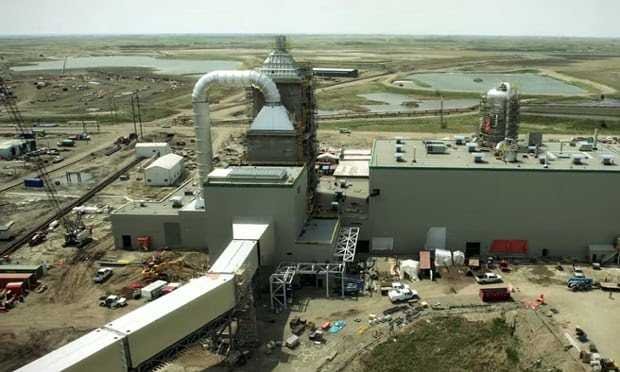Canada switches on world's first carbon capture power plant

Canada has exchanged on the main expansive scale coal-terminated power plant fitted with an innovation that defenders say empowers the consuming of petroleum derivatives without tipping the world into an atmosphere calamity.
The venture, the main business scale plant outfitted with carbon catch and capacity innovation, was held up by the coal business as a genuine case that it is conceivable to continue consuming the dirtiest of petroleum products while staying away from perilous an Earth-wide temperature boost.
Saskatchewan's state-claimed power supplier is because of cut the strip on the $1.3 billion Canadian venture on Thursday. In any case, authorities from SaskPower International Inc advised visitors welcomed to the function the 110 megawatt plant went live on Tuesday night
The Boundary Dam control plant guarantees to cut carbon dioxide outflows by 90% by catching C02 underground before the gas achieves the air – making its opening a point of reference in the coal business' endeavors to stay practical in a low-carbon economy.
The organization said the venture would lessen ozone harming substance discharges by around 1 million tons per year, or what might as well be called taking 250,000 autos off the street, in one of the more non-renewable energy source subordinate locales of Canada.
Caught CO2 from the Boundary Dam venture will be pumped underground and sold to the Cenovus oil organization for use in preparing close-by oil fields, or covered in geographical developments.
"Saskatchewan is number one on the planet," said Brad Page, the CEO of the Global CCS Institute, said. "This is a staggeringly essential occasion from our point of view."
Researchers from the United Nations atmosphere board said a year ago that without expansive arrangement of CCS innovation the majority of the world's petroleum product should remain in the ground to maintain a strategic distance from risky environmental change.
Page was careful however in foreseeing CCS innovation sent at Boundary Dam would soon be duplicated on an extensive scale.
He noticed the Saskatchewan plant depends on a neighborhood wellspring of coal – and on offering on the CO2 to the oil business – to keep it operating at a profit. Coal likewise faces extraordinary rivalry from generally low costs for gaseous petrol, which makes it restrictively costly to fabricate new coal plants with CCS.
All things being equal, the opening of Boundary Dam speaks to an uncommon example of overcoming adversity for the CCS business.
The innovation has not been completely grasped by the enormous US coal organizations – which are as yet centered around restricting approaching force plant rules from the Environmental Protection Agency.
CCS is additionally seen with profound doubt by ecological campaigners since its financial suitability - so far - relies upon utilizing the CO2 to build oil creation, and in light of the fact that it is more costly than inexhaustible wellsprings of energs.
The innovation of carbon catch and capacity has been around for a considerable length of time. "This isn't a moonshot," Ian Yeates, the SaskPower official accountable for CCS, told the Guardian not long ago.
Be that as it may, ventures consolidating power age and CCS have confronted long deferrals and cost invades, and keep running into feedback for accepting government sponsorships. A number have been abandoned through and through in view of rivalry from verifiably low costs for petroleum gas.
In Mississippi, Southern Company has spent more than $5.5 bn in the course of the most recent six years attempting to bring another manufactured CCS venture, the Kemper County Energy Facility, into task. The opening is currently deferred until mid-2015.
Just a single different CCS venture including power age is as of now on the sheets in the US, in Texas.
Limit Dam guaranteed its cost over-runs had nothing to do with the CCS innovation, however in other development issues engaged with upgrading a 50-year-old power plant. Authorities likewise said they were sure they could acquire the following such CCS venture 25% less expensive.
The plant got some CAD$240m in endowments.
In any case, Yeates recognized that now the practicality of the innovation relied upon having a close-by wellspring of coal and an extra income stream from the improved oil recuperation. "I think at this phase of the diversion, on the grounds that the idea is so new, having an income stream from the CO2 is basic to help the financial matters. In any case, I think in the end that won't be required," he said.
Congratulations @sk33555! You have received a personal award!
Click on the badge to view your Board of Honor.
Do not miss the last post from @steemitboard:
Congratulations @sk33555! You received a personal award!
You can view your badges on your Steem Board and compare to others on the Steem Ranking
Vote for @Steemitboard as a witness to get one more award and increased upvotes!